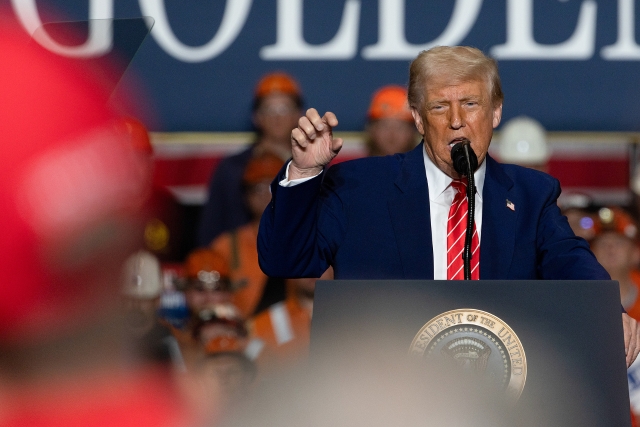
U.S. President Donald Trump speaks at the US Steel Corporation Irvin Works facility in West Mifflin, Pennsylvania, U.S., on May 30, 2025. (Photo: CFP)
Recent court rulings and shifting tariff policies under the Trump administration are creating uncertainty for small business owners across the United States.
On May 30, U.S. President Donald Trump announced that the U.S. would double tariffs on steel and aluminum imports—from 25% to 50%—starting June 4 at a rally in Pittsburgh, Pennsylvania. The move came just one day after the U.S. Court of Appeals for the Federal Circuit temporarily stayed a lower court ruling that had blocked Trump's sweeping tariffs. The contested measures, including the so-called "Liberation Day” tariffs announced on April 2, were imposed under emergency economic powers.
On May 28, the U.S. Court of International Trade declared Trump's unilateral tariffs unlawful, stating that he had exceeded his authority under the International Emergency Economic Powers Act (IEEPA).
Trump invoked the IEEPA to justify imposing tariffs of 20% on Chinese goods and 25% on imports from Mexico and Canada, arguing that the measures were necessary to combat fentanyl trafficking into the United States.
However, the court found that the administration failed to meet the legal threshold for declaring an economic emergency. The judges concluded that the tariffs did not directly address the fentanyl trade but were instead designed to exert broader economic pressure on foreign governments.
The lawsuit also argued that the IEEPA does not grant the president the authority to impose tariffs at all, and even if interpreted to do so, it would amount to an unconstitutional delegation of Congress's power over trade.
The plaintiffs claimed the tariffs have done more harm than good, particularly to small and medium-sized enterprises.
"Instead of focusing on growing our business, creating more jobs in our region, and developing new products that our customers want, we are spending countless hours trying to navigate the tariff chaos that the president is causing for us and all our vendors,” said Dan Pastore, president and co-founder of FishUSA, one of the businesses behind the legal challenge.
Ryan Hill, a San Francisco-based fashion entrepreneur, described the challenges of operating amid unpredictable trade policy. "When the 90-day tariff pause was announced, I ordered a bunch of our out-of-stock items. I told the factory to finish production within a month so the goods would arrive in the U.S. before the pause expired,” he told GDToday.
"Since these policies are so back and forth, it's almost impossible to plan for future product streams,” he added.
Reporter | Liu Xiaodi, Ouyang Zixuan (intern)
Interview Coordination | Guo Zedong
Editor | Yuan Zixiang, James, Shen He

















